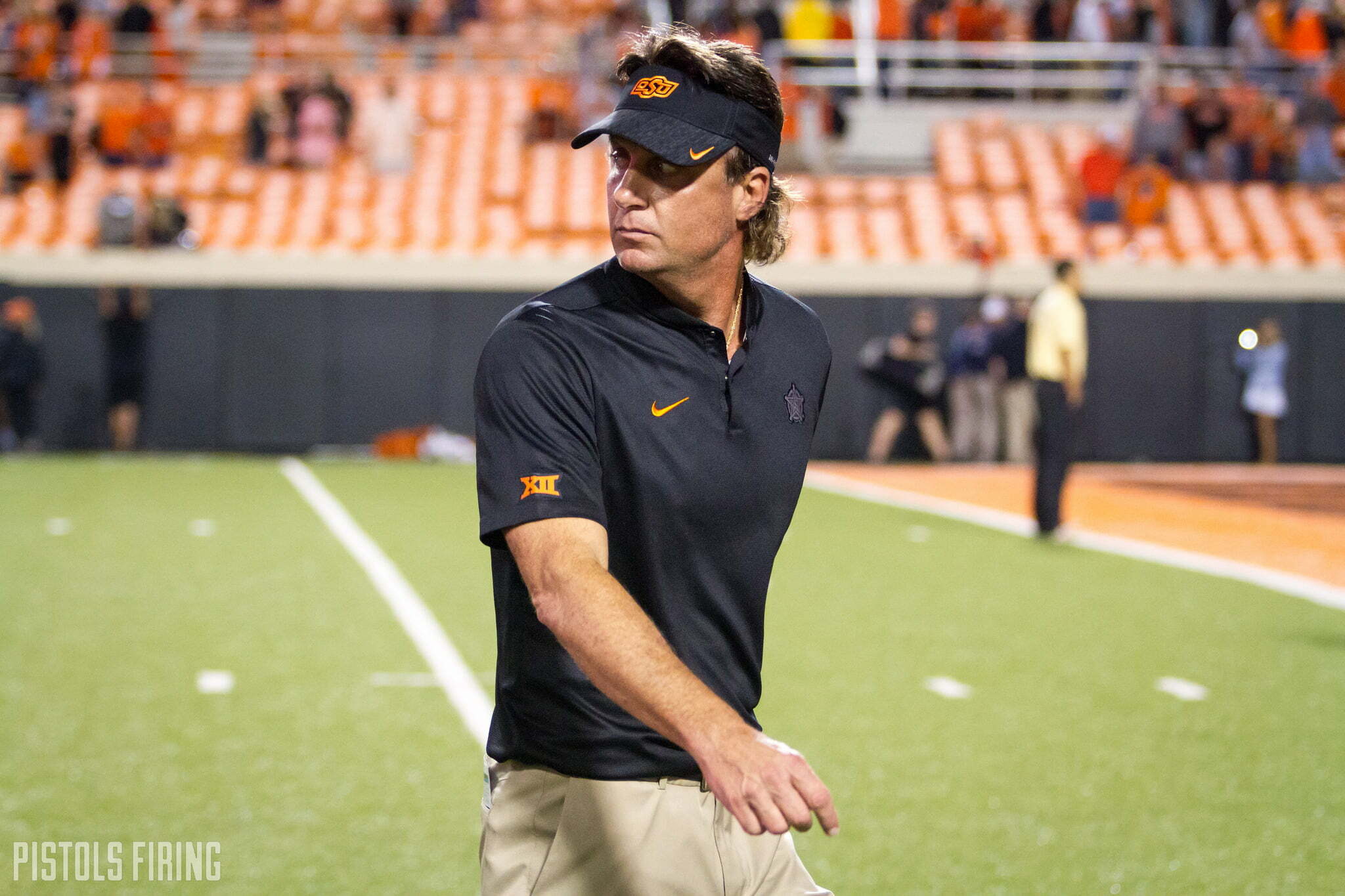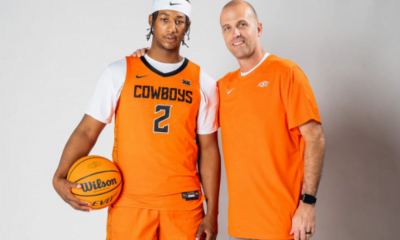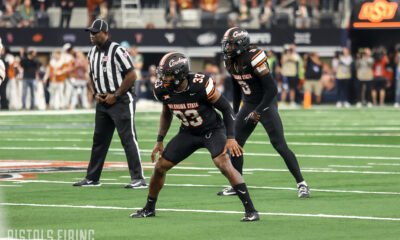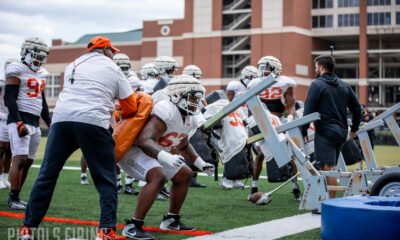Football
Mike Gundy’s Demand a Problem, but Certainly Not the Only Problem
On this week and how it all went down.

I worked for six years to get a credential to Oklahoma State practices and games. Six years. I wrote and thought and researched and brought people in who did the same. We worked our asses off to build something that is equal parts credible, fun, engaging, entertaining and intriguing.
You might find it utter silliness that I remember where I was and what I was doing when OSU called me and said that we were in, but that meant something to me. Did this new reality completely revolutionize our business model and change the way we did things? No. Did it provide any affirmation about who I was as a person or what our organization was doing? No. But with it came a weightiness that I didn’t (and don’t) take lightly. Six years is a long time.
Being credentialed meant more information, more photos and more stuff that you guys, the consumers, want. It meant credibility. It was another tool — a very valuable tool — with which to build a business. One we never had before.
Covering college athletics has been a delight. Building a business maybe even more so. I cannot imagine a more fun day-to-day undertaking than thinking about, figuring out and ultimately distilling large amounts of information in intriguing and (hopefully) humorous ways.
What Mike Gundy did this week at practice on Tuesday was wrong. Fundamentally, what he was trying to accomplish wasn’t wrong — it was probably smart — but the way he went about it could not have been less helpful to a currently-combustible situation in Stillwater. Nobody who thinks clearly and logically about the way the world works and what the job of the fourth estate actually is within a republic thinks it was anything other than wrong.
I also don’t believe it was done maliciously. It seemed like an in-the-moment call that was just a poor choice, not a long-term plan to make everyone’s jobs as difficult as possible. The fact that it seems like (?) the restriction has been lifted (see video below) more or less proves that.
KFOR was at Tuesday’s #OKState media availability. We’ve been in contact with OSU about what took place. pic.twitter.com/Kt5buvfCrz
— KFORsports (@KFORsports) September 27, 2018
Although PFB was represented at practice this week, I was personally not in attendance. Because of that I’m not going to rehash all of the details, and to be honest if you’re reading this post then you likely care enough to have read them elsewhere. But generally speaking, it is in literally nobody’s best interest to start telling members of the media what they can and cannot ask the people or organization they are covering.
To be clear, there is a Jelani Woods-sized difference between restriction and this form of censorship. Powerful public figures restricting access to the press: Maybe not smart but probably not wrong. Powerful public figures trying to dictate what their organization is asked about: Definitely not smart and definitely wrong. Twitter has proven over the last 24 hours, though, that nobody is changing sides over this. It is the most fruitless of debates. Mike Gundy aside, if you believe anyone who is covered by the press should be allowed to adjudicate what questions the press can or cannot ask, nothing I say is going to change your mind. It’s an absurd position to take — and I have some history books to walk you through — but I’m not going to convince you otherwise.
There are hundreds of ways to restrict information — sports organizations have (probably correctly) been moving in this direction for years, which, somewhat ironically, has led to the rise of sports blogs like this one — and Gundy picked probably the worst one. Even canceling media availability would have been far more reasonable and far less explosive a decision.
So yes, Mike Gundy’s decision was not a great one, but as someone who built this thing without having any media access at all for six years, I can’t say I was all that decimated about our team not getting to ask a couple of questions about somebody transferring to another school.
Was it a good look for Gundy or OSU? Not really, but I live in a world where I would sometimes rather organizations have no access at all because I think PFB could and would thrive in that world (that’s probably a personal aside and not worth diving too deep into right now, though).
What I was actually more offended by than Gundy’s decision was the rhetoric from people who weren’t there about people who were, specifically this tweet from an Oklahoma State professor about the entire situation.
And most disappointing was the reaction of the professional journalists. Bullied into silence. @spj_tweets @APSE_sportmedia @rcfp @collegemedia @1stAmendmentCtr
— Joey Senat (@Joey_Senat) September 26, 2018
Most disappointing was the reaction of the professional journalists.
Are you kidding me with that? You sit in a classroom and teach theories and concepts while we stand in front of Gundy and other coaches and players and have to make decisions and engage in reality. Then something goes down that, if handled incorrectly, could erase literally several years worth of work … and you’re most disappointed in journalists?
To be clear, we are talking about two separate issues here. Gundy’s decision is over there, and we already talked about it. This one, though, incensed me more. Maybe I’m just #MadOnline, but I think it’s pretty easy to talk about what should or should not be said and done in the arena when you’re sitting in the nose bleeds.
Also, we’re talking about a fourth-option receiver transferring to a different school, not the rise and fall of the Roman empire. Is democracy at stake? I kinda doubt it!
To be fair, Senat’s credentials speak for themselves, and I’m not saying his general posture is wrong, but there has to be a little context. You can’t just categorically say “everyone there was disappointing” without any room for nuance.
This should go without saying, but we as an organization are not going to risk losing everything that has been built for a couple of questions that would almost certainly get a “no comment” about the fourth receiver on an 8-4 team. We’re not going to play a role out of a movie so that eight other media members can fist bump us for being brave. Maybe that makes us soft. Maybe it makes us smart. I don’t really care which one you think.
Some of this gets at the tension between journalism as a business venture and journalism as a basic public service. I think that as an industry sometimes so much of our energy goes toward doing Journalism for the sake of doing Journalism and not toward serving our constituents. Is it worth calling somebody’s bluff when so few of the people who actually pay your bills care about having what little information would have come out of it to begin with? Even if they all care, one story isn’t worth it. Not for us, certainly.
Maybe I’m making this into less than it should be because I lack traditional training, but we’re talking about Big 12 football, not nuclear war. Now we can argue all day about whether our constituents should care more about fourth estate values and distinctives, but that’s not going to, you know, make them care more about fourth estate values and distinctives. As it is, they don’t, and we’re not going to light ourselves on fire trying to make them.
So yeah, it’s been a weird week in OSU world. A public that has immersed itself in a post-Obama world rife with journalism and content creation as nothing more than fake news and crooked media (unless you agree with it, of course). An institution in Oklahoma State that (perhaps inadvertently) put itself in the spotlight for a number of (very avoidable) reasons. And a group of writers, thinkers and podcasters who have to try and play both sides.
All of this will eventually blow over of course — somewhat ironically a big day from somebody named Justice on Saturday would help — but this week was another in a long series of intriguing moments in Stillwater. Gundy was wrong — and you shouldn’t feel great about doubling down and riding for him — but we shouldn’t make this into more than what it was. Six years is a long time, and there’s certainly more than one way to skin a cat.

-

 Hoops4 days ago
Hoops4 days agoUCF Transfer Marchelus Avery Commits to Oklahoma State
-

 Hoops4 days ago
Hoops4 days agoWashington Transfer Wesley Yates Visits Oklahoma State
-

 Football3 days ago
Football3 days agoOklahoma State Linebacker Donovan Stephens Enters Transfer Portal
-

 Football3 days ago
Football3 days agoSpring Football: A Defensive Line Switch That Could Utilize the Cowboys’ Playmakers






